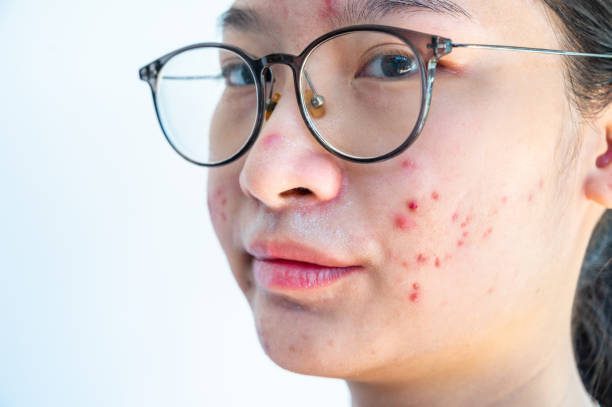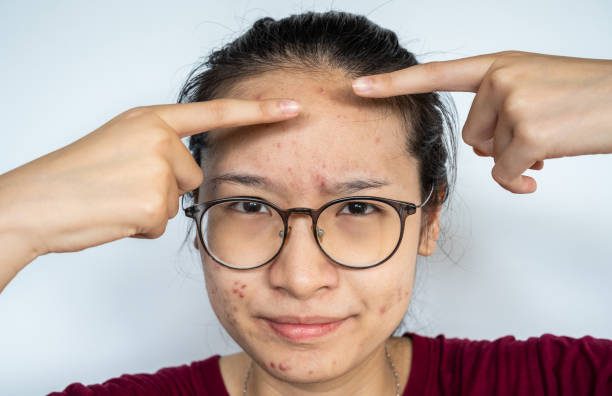Did you know that stress, bad foods, sebum, and blackheads can make acne worse? Stress can change your hormones and cause pimples. Eating sugary and greasy foods can make your skin oily and cause pimples. Dermatologists can help with acne using treatments like creams and medications.
Common Causes of Acne
Family history, genetics, hormones, and underlying causes are big factors in getting acne breakouts. Your family history and genes can make you more likely to have pimples because of your health, glands, and pimples. Indirect factors, like genetics, passed down from parents, can make someone more likely to have acne.
When your body changes, like during puberty or your period, sebaceous glands near hair follicles may cause acne due to hormones. These changes trigger acne, causing pimples. There are treatments to help with hormonal acne.
Eating too much sugar and dairy can make acne worse. Some foods might not be good for your skin. Eating better can help your skin look and feel better for your health.
Stress makes acne worse by making more oil and redness. Relaxing can help the skin get better. Feeling good inside can make acne less bad.
Some medicines can make acne worse. It’s important to ask skin doctors about drugs that can help or harm your skin, like isotretinoin, spironolactone, and retinoids for acne.
Pollution can make acne worse by blocking pores and making skin red. Use good skincare, cosmetics, and makeup with clean applicators to protect skin from pollution, oil, and keep it clear. Preventing pollution can help keep skin healthy.
Factors Contributing to Acne Worsening
Washing too much or using strong products can make acne worse due to excess oil production. Use a gentle skincare routine that fits your skin to keep it healthy. Don’t use products that bother sensitive skin to help with acne.
Using the wrong skincare products can clog your pores and cause acne breakouts due to acne-causing bacteria. Look for products without pore-clogging ingredients to avoid acne. Choosing non-comedogenic products is good for people with acne-prone skin.
Smoking, cigarette influence, and bad food can worsen skin due to nicotine effects and cause more acne. Eating well and being healthy can help skin look better. Bad habits can lead to more acne.
Hormones can make acne happen. Fixing hormone levels helps manage acne. Doctors can help with treatments for hormonal acne.
Some people believe wrong things about cleaning their skin. Learning the truth helps you take care of your skin and get rid of acne.


Myths About Acne Causes
Some say eating oily food or chocolate can cause pimples, but there’s no proof. People also think not washing your face causes acne, but it’s actually from genes, hormones, and skin germs.
It’s important to ignore lies about skin and do what dermatologists say. Use gentle cleansers and don’t scrub too hard to manage acne. Remember, everyone’s skin is different.
Stress and Acne Worsening
Stress makes acne worse by making the skin produce more oil and clogging pores. It also makes it harder for the body to fight off acne-causing bacteria.
Doing exercise, meditation, or talking to someone can help with acne. Take care of yourself, manage stress, and practice skincare for healthy skin and feeling good.
Diet Impact on Acne
Do you want to get rid of acne? Eating healthy food can help your skin. Stop eating greasy fast food and try nutritious meals. Your skin will be happy! You can also cook yummy recipes that fight acne. It’s a good idea for your skin and your taste buds!
Let’s eat better food for our health to make our skin look awesome! Food can help our skin shine. Let’s go for it!
Nicotine and Acne Connection
Nicotine can make acne worse. It messes up hormones and makes skin oily. This oil can block pores and cause pimples. Nicotine also slows down skin healing.
Using nicotine products can cause acne. To prevent acne, don’t use nicotine from smoking and take care of your skin by washing it gently and using moisturizer.
Predisposition to Acne Development
Some people may get acne because of their genes. Hormonal changes, such as hormones changing during puberty or periods, can also make acne worse.
Things like what you eat, how stressed you are, and how you take care of your skin can worsen acne. It’s important to look at all these factors, including hormones like estrogen and Androgen, together to control acne. Talking to skin doctors, experts, and health information can help you make a plan that’s right for you.


Identifying Personal Triggers
Preventing and Managing Worsening Acne
To help your skin with acne, use gentle cleansers and good skincare products.
When picking skincare stuff, think about your skin type. If you have oily skin, use light products that won’t clog pores. Dry skin likes hydrating stuff like hyaluronic acid.
Picking the best skincare means looking at what’s in it, like salicylic acid for oily skin or niacinamide for redness and acne. These things help with acne problems.
It’s important to include pimple care in your skincare routine to clean your face properly and stop acne. Use a gentle cleanser to get rid of dirt and oil without drying out your skin. Choose a gentle, fragrance-free cleanser for skin that gets pimples to prevent irritation and use non-comedogenic products.
Psychological and Emotional Factors
Stress and Mental Health
Stress can make acne worse. It’s important to manage stress for healthy skin. Doing things like deep breathing or yoga can help reduce stress and acne.
Research says stress can make acne worse by changing hormones, including androgens. To help with acne, talk to a dermatologist for personalized tips on handling stress.
It’s important to manage stress when acne makes us feel sad and worried. Acne, caused by hormone imbalance, can hurt how we feel about ourselves, cause stress, and make us feel down. Talking to family or a therapist can help us handle our feelings about skin problems and stress.
Relationship between stress levels, hormonal changes, and acne severity
Stress can make acne worse by messing up hormones and making sebaceous glands oily. Exercise and sleep can help fix this.
Stress, hormones, and acne are linked, so taking care of your skin in a special way is super important. Eating healthy foods like fruits and veggies, drinking lots of water, and not eating too much sugar can help make your skin look better.
To stop stress acne, do things that help you relax like reading or walking. Taking care of your mind, especially managing stress and getting enough sleep, is just as important as taking care of your skin for healthy skin.
The psychological impact of acne on self-esteem, anxiety, and depression
Acne can make people feel bad and stressed due to hormones and inflammation. It’s important to say nice things to yourself and get help if you need it.
Acne can make people feel sad and worried. Writing in a journal or joining a group can help you feel better and reduce stress. Remember, many people get acne too.
Dealing with acne can be hard, but it’s important to be patient and kind to yourself. Remembering what makes you special and good at things other than looks can help you feel better about yourself. Being proud of who you are and what’s inside is key to feeling strong when acne makes you feel down.


Hygiene Practices
Cleansing Routine
Washing your face every day with a gentle cleanser washes helps keep your skin clean and prevents acne.
Washing your face helps stop germs from causing pimples. Don’t scrub too hard or it can make acne and blemishes worse.
I do my daily skincare routine by washing my face every day, and it’s made my skin better. I use gentle stuff and now my skin looks nice and clear.
Avoiding Touching
Don’t touch your face a lot because your hands have germs that can make acne worse. Germs on your hands, including acne-causing bacteria, can go to your face and cause redness, pimples, and skin infections.
Don’t squeeze acne, female acne, hormonal acne, pimples, or blemishes ’cause it can make them worse and leave scars. Be gentle when touching your skin to keep it healthy, prevent bad acne, and use oil.
I learned from my experience that not touching my face helps prevent pimples. I noticed my skin got better when I stopped touching it.
Changing Pillowcases Regularly
Changing your pillowcase often is important for managing acne. Dirty pillowcases can have bacteria and oils that can make acne worse when they get on your skin while you sleep.
Changing your pillowcase every week keeps your skin clean. Choose a soft cotton fabric to avoid irritation.
When I do this easy step every day, my skin feels better and I get fewer pimples.


Importance of proper hygiene, including regular changing of pillowcases and towels
Impact on Skin Health
It’s important to keep things clean to stop pimples. Change pillowcases and towels often to avoid germs that can block pores on your face.
Keeping clean helps prevent acne. Change your pillowcases and towels often to avoid germs that can make acne worse.
Changing your pillowcases and towels often helps keep your skin clear and healthy. It stops acne-causing bacteria from sticking around.
Developing Healthy Habits
Changing your pillowcases and towels every few days can help make your skin better. It stops dirt and oil from building up and causing pimples and acne breakout.
It’s important to keep your face skin clean as part of your skincare routine to avoid pimples, blemishes, and acne breakouts. Change your pillowcases and towels often to help stop acne and new breakouts.
Keeping clean and changing pillowcases and towels can help manage acne and make your skin healthier.
Personal Experience
I noticed my skin got better when I started changing my pillowcases more. It’s a small thing but it helped my skin a lot.
Changing my towels often helps prevent acne on my face. It’s an easy way to keep my skin healthy.
Tips for maintaining clean skin and avoiding bacterial buildup
Proper Cleansing
Washing your face with a gentle cleanser helps get rid of dirt, oil, and germs that can block pores.
Washing your skin two times a day helps keep it clean and stops acne from getting worse.
Using the right face wash helps keep your skin clean and stops acne from getting worse.
Hydration and Moisturization
Drinking enough water every day helps clean your body and keep your skin clear.
Put on a special moisturizer after washing your face to keep it moist and not make it oily.
Putting lotion on your skin a lot can stop it from getting dry and itchy, which might help prevent pimples and acne prevention.
Avoiding Harsh Products
Don’t use harsh skincare with alcohol or fragrances to avoid making acne worse.
Pick gentle products with few ingredients to avoid skin reactions and breakouts caused by harsh chemicals.
Picking products that say “non-comedogenic” won’t block pores or make acne worse.


Prevention and Management Strategies
Skincare Tips
Choosing suitable skincare products and avoiding comedogenic ingredients
When picking skincare stuff, choose non-comedogenic products that won’t clog your pores and holes. Don’t use products with alcohol or fragrances as they can make acne worse. Use gentle cleansers, oil-free moisturizers, and acne remedies to keep your skin clear.
Proper cleansing techniques and post-workout skincare routines
After exercising, wash your face with a gentle cleanser to remove sweat and dirt that can cause acne. Then use a light lotion or moisturizer to keep your skin moist without causing pimples. It’s important to have a routine skincare regimen after working out to avoid acne. Wash your face.
Dietary Modifications
Recommendations for a skin-friendly diet, including foods rich in antioxidants and vitamins
Eating berries and green veggies can make your skin healthy. Foods like salmon and nuts can also make your skin look shiny.
Hydration guidelines and the role of water in skin hydration
Drinking water is super important for healthy skin. It helps clean out bad stuff in your body. Drink 8 glasses a day to keep your skin looking great!
Professional Guidance
Importance of consulting dermatologists for personalized treatment plans
Seeing dermatologists is super important to make a plan for your skin, acne that fits you. They can help you with skincare tips, suggest therapy, or recommend treatments for acne, like hormone therapies from a skin doctor. Going to a dermatologist, a skincare professional and acne specialist in dermatology, helps you take the best care of your skin and health.
Overview of medical interventions, including medications and procedures
If you have bad acne, dermatologists can give you creams, pills, or laser treatments, or skin medication to help. They will check your skin and tell you what’s best for you by a skincare professional in dermatology. Knowing your choices can help you pick the right treatment for your skin.
Age-Specific Considerations
Acne can affect people of all ages. Teens get acne from hormones, adults from stress, and older people have skin problems.
Addressing acne in different age groups, such as teenagers, adults, and older individuals
It’s important to treat acne differently based on age. Teens need gentle cleansers for breakouts, adults may need anti-aging products with acne treatments, and older people should focus on hydrating products for dry skin and acne.
Age-related factors that may contribute to acne development and management strategies
Hormones can cause acne during puberty or menopause. Use skincare for your age. Teens might need oil-control products to regulate sebaceous glands, while older people can try chemical peels or creams to help with acne and aging.
Final Remarks
To stop acne, we need to understand what causes it like skin infections, chronic conditions, inflammation, and our immune system. Washing your face and changing your pillowcases often can help you sleep. Keeping your skin clean and following good hygiene habits can stop bacteria from growing. Follow these tips to keep acne under control.
Take care of your skin by making small changes. Wash your pillowcases more and keep clean. Your skin will be happy!
Frequently Asked Questions
What age is acne the worst?
Acne can happen when you’re a teenager because of hormones, but it can also affect anyone at any age for several reasons. Talk to dermatologists, specialists in dermatology, a skin doctor, and medical experts for help just for you.
How do I stop growing acne?
To stop acne, wash your face every day, don’t touch it a lot, eat healthy, and stay calm.
What are the 8 acne triggers?
- Hormonal changes
- Certain medications
- Diet high in refined sugars
- Stress
- Genetics
- Harsh skincare products
- Environmental factors
- Bacteria on the skin
Can poor hygiene cause acne?
Not washing your face can make acne worse because germs like to live on your skin. Remember to wash your face often and don’t use dirty things on it for daily skincare and skin care.
Is there a link between diet and acne?
Eating too much sugary and fatty foods can make acne worse. Eating lots of fruits, veggies, and whole grains is good for your skin.


